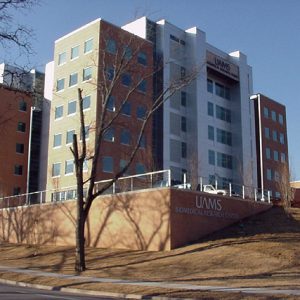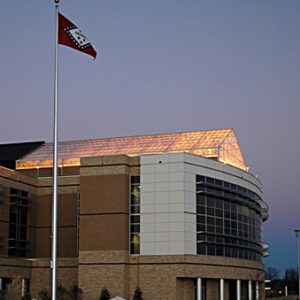calsfoundation@cals.org
Arkansas Biosciences Institute (ABI)
The Arkansas Biosciences Institute (ABI) was created as the major research component set forth in the Tobacco Settlement Proceeds Act of 2000, passed by sixty-four percent of Arkansas voters in the general election on November 7, 2000. The primary goal of ABI is to improve the health of Arkansans through new and expanded agricultural and biomedical research initiatives, and, to that end, it operates as a partnership in health-related research with its five member institutions: Arkansas Children’s Hospital Research Institute, Arkansas State University (ASU), the University of Arkansas Division of Agriculture, the University of Arkansas (UA) in Fayetteville (Washington County), and the University of Arkansas for Medical Sciences (UAMS).
The Tobacco Settlement Proceeds Act of 2000 directed the State of Arkansas to invest its proceeds from the Tobacco Master Settlement Agreement in seven health-related programs, including the Arkansas Biosciences Institute. In accordance with the Tobacco Settlement Proceeds Act, the objectives of the Arkansas Biosciences Institute are to conduct the following: agricultural research with medical implications; bioengineering research that expands genetic knowledge and creates new potential applications in the agricultural and medical fields; tobacco-related research that identifies and applies behavioral, diagnostic, and therapeutic knowledge to address the high level of tobacco-related illnesses in Arkansas; nutritional and other research aimed at preventing and treating cancer, congenital and hereditary conditions, or other related conditions; and other areas of developing research that are related or complementary to primary ABI-supported programs. Additionally, ABI-supported researchers are moving their work from the research laboratory to entrepreneurship. As of 2006, four new biotechnology companies headed by ABI-supported scientists were formed in Arkansas: InterveXion Therapeutics LLC, Nature West Inc., Nutraceuticals Innovations LLC, and Therevec Inc.
Annually, ABI helps fund approximately 150 research projects at the five member institutions. Some of those research projects have included the study of passive smoke exposure and its effect on lung development, vaccine development, nanomaterials as noninvasive cancer therapeutics, and targeted gene transfer in cancer cells. Proceeds from the Tobacco Settlement Fund Account for ABI total approximately $10–$13 million annually, and in the first six years of operation, ABI scientists averaged a 3:1 return ratio (over $168 million) on investments from extramural agencies.
Two new research facilities were funded by the Arkansas Tobacco Settlement Proceeds Act. ASU opened its 88,000-square-foot Biosciences/Biotechnology Center in October 2004, with laboratory, classroom, and greenhouse space for ABI-supported research. UAMS opened the Biomedical Research Center II in January 2003, with 141,000 square feet of laboratories and shared research facilities.
For additional information:
Arkansas Biosciences Institute. https://www.astate.edu/abi (accessed September 8, 2022).
Arkansas Tobacco Settlement Commission. http://www.atsc.arkansas.gov (accessed September 8, 2022).
Hand, Eric. “UA Team’s Tobacco Snags Methamphetamine in Blood.” Arkansas Democrat-Gazette. August 1, 2004, p. 4B.
Heard, Kenneth. “ASU Bioscience Lab Readies for Its Debut.” Arkansas Democrat-Gazette. September 17, 2004, p. 1D.
Yee, Daniel. “Biosciences Institute Gathers for First Time.” Arkansas Democrat-Gazette. January 19, 2002, p. 2B.
Robert E. McGehee Jr.
University of Arkansas for Medical Sciences
 Arkansas Biosciences Institute (ABI)
Arkansas Biosciences Institute (ABI)  Arkansas Biosciences Institute (ABI)
Arkansas Biosciences Institute (ABI) 




Comments
No comments on this entry yet.